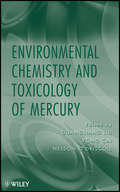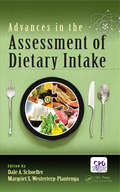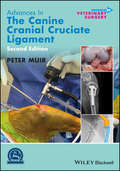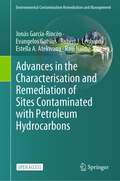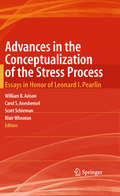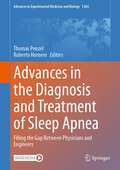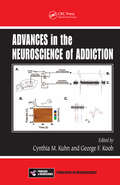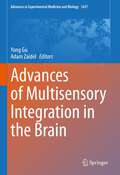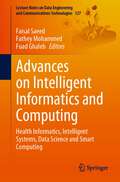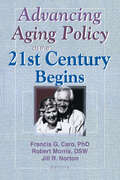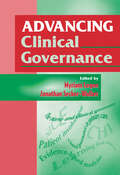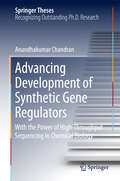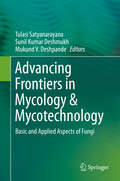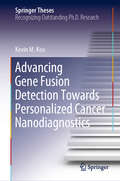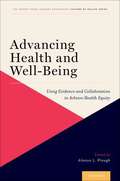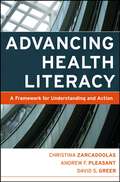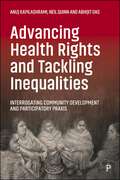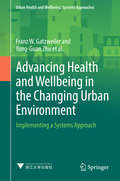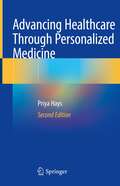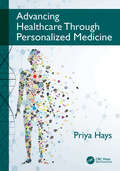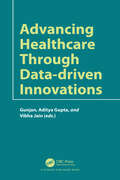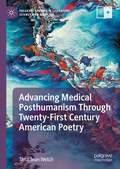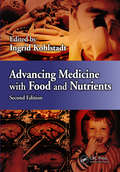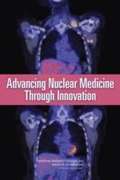- Table View
- List View
Advances in environmental chemistry and toxicology of mercury
by Guangliang Liu Yong Cai Nelson O'DriscollThe book that looks at mercury's impact on the planet today Recent research by the EPA has concluded that one in six women of childbearing age have unsafe levels of mercury in their bodies, which puts 630,000 newborn babies each year at risk of neurological impairment. Mercury poses severe risks to the health of animals and ecosystems around the world, and this book provides the essential information that anyone interested in environmental sciences should know about the fundamentals of the entire mercury cycle. Comprised of four parts that present an overview of mercury in the environment, mercury transformations, transport, and bioaccumulation and toxicology, each chapter of Environmental Chemistry and Toxicology of Mercury includes the basic concepts of the targeted subject, a critical review of that subject, and the future research needs. This book explains the environmental behavior and toxicological effects of mercury on humans and other organisms, and provides a baseline for what is known and what uncertainties remain in respect to mercury cycling. The chapters focus on the fundamental science underlying the environmental chemistry and fate of mercury. This work will be invaluable to a wide range of policy experts, environmental scientists, and other people requiring a comprehensive source for the state of the science in this field.
Advances in the Assessment of Dietary Intake.
by Dale A. Schoeller M. WesterterpDiet is a major factor in health and disease. Controlled, long-term studies in humans are impractical, and investigators have utilized long-term epidemiological investigations to study the contributions of diet to the human condition. Such studies, while valuable, have often been limited by contradictory findings; a limitation secondary to systematic errors in traditional self-reported dietary assessment tools that limit the percentage of variances in diseases explained by diet. New approaches are available to help overcome these limitations, and Advances in the Assessment of Dietary Intake is focused on these advances in an effort to provide more accurate dietary data to understand human health. Chapters cover the benefits and limitations of traditional self-report tools; strategies for improving the validity of dietary recall and food recording methods; objective methods to assess food and nutrient intake; assessment of timing and meal patterns using glucose sensors; and physical activity patterns using validated accelerometers. Advances in the Assessment of Dietary Intake describes new avenues to investigate the role of diet in human health and serves as the most up-to-date reference and teaching tool for these methods that will improve the accuracy of dietary assessment and lay the ground work for future studies.
Advances in the Canine Cranial Cruciate Ligament
by Peter MuirAdvances in the Canine Cranial Cruciate Ligament, Second Edition presents in-depth, focused, and updated coverage of current knowledge on cruciate ligament rupture, using a multidisciplinary, evidence-based approach. Presents a state-of-the-art summary of the most recent knowledge on this important cause of lameness in dogs Led by a highly respected surgeon and researcher, with chapters written by leading experts in the field Provides an update to the groundbreaking first edition, with six new chapters
Advances in the Characterisation and Remediation of Sites Contaminated with Petroleum Hydrocarbons (Environmental Contamination Remediation and Management)
by Ravi Naidu Jonás García-Rincón Evangelos Gatsios Robert J. Lenhard Estella A. AtekwanaThis open access book synthesizes important advances in the assessment and management of soil and groundwater systems contaminated with petroleum hydrocarbons, especially in the form of light non-aqueous phase liquids (LNAPLs). LNAPL characterization and remediation is challenging due to the multi-phase, multi-component nature of the problem and the various physical, chemical, and biological processes involved in a dynamic and heterogeneous hydrogeological setting. This book focuses on the current state of practice of LNAPL characterization and remediation and seeks to provide information and a framework that would allow some of these complexities to be better addressed by contaminated land practitioners, researchers, and regulators.
Advances in the Conceptualization of the Stress Process: Essays in Honor of Leonard I. Pearlin
by William R. Avison Scott Schieman Blair Wheaton Carol S. AneshenselThe stress process paradigm has been one of the most dominant conceptual models of health and illness over the past three decades. The contributions to this volume chart a new course for the stress process, extending the paradigm conceptually, methodologically, and substantively. Written in honor of Leonard I. Pearlin, the leading proponent of the stress process, the contributions to this volume provide a new direction for stress process research. Featuring contributions from leading researchers, and an afterword by Leonard I. Pearlin, this comprehensive volume covers three major sections: -Conceptual and methodological extensions of the stress process -The roles of family and work in the stress process, throughout the life course - Psychosocial factors that impact health outcomes. This volume will be an invaluable resource for researchers in sociology, social psychology and public health, all seeking to understand the pervasive role of stress on social disparities in health and illness.
Advances in the Diagnosis and Treatment of Sleep Apnea: Filling the Gap Between Physicians and Engineers (Advances in Experimental Medicine and Biology #1384)
by Thomas Penzel Roberto HorneroThe book focuses on biomedical innovations related to the diagnosis and treatment of sleep apnea. The latest diagnostic tools are described, including sleep laboratory equipment, wearables, and even smartphone apps. Innovative medical devices for treatment are also covered, such as CPAP, Auto-PAP, hypoglossal nerve stimulation, phrenic nerve stimulation, acoustic brain stimulation and electrical brain stimulation. This is an ideal book for biomedical engineers, pneumologists, neurologists, cardiologists, physiologists, ENT physicians, pediatrics, and epidemiologists who are interested in learning about the latest technologies in treating and diagnosing sleep apnea.
Advances in the Neuroscience of Addiction (Frontiers in Neuroscience)
by George F. Koob Cynthia M. KuhnUnderstanding the phenomenon of long-lasting vulnerability to addiction is essential to developing successful treatments. Written by an international team of authorities in their respective fields, Advances in the Neuroscience of Addiction provides an excellent overview of the available and emerging approaches used to investigate the biologic mechanisms of drug addiction. It also delineates the promising research discoveries being made in relapse prevention.The book begins with current animal models of addiction, which mimic the state of humans entering treatment: recently-abstinent animals that receive common triggers for relapse (classical conditioning, stress, and neuroadaptive dysregulation). Coverage then shifts to the use of electrophysiologic approaches, which enable researchers to characterize the discharge patterns of single neurons during drug self-administration. After exploring advances in voltammetry and enzyme-linked biosensors for measuring glutamate, the book discusses the theoretical background and results of neuroimaging studies related to neuronal networks that are activated by drug-specific cues. It then describes modern genetic approaches to manipulate target proteins that influence addictive behavior.The book rounds out its coverage by illustrating how a neuroeconomic approach can inform studies of reward processing in general and addiction in particular. It is a comprehensive introduction to the methodologies of the field for students and beginning researchers and an essential reference source for established investigators.
Advances of Multisensory Integration in the Brain (Advances in Experimental Medicine and Biology #1437)
by Yong Gu Adam ZaidelThis book presents the latest research on multisensory brain function. Namely, the mechanisms by which the brain processes and integrates information from multiple sensory modalities. Its contents cover a broad range of topics, including optimal integration, cross-modal interactions, calibration, and causal inference – with an emphasis on their neuronal underpinnings. By bringing together efforts from different laboratories around the world we aim to collaboratively shed light on these fundamental brain processes, that underlie perception, cognition, and behavior in a complex multisensory world, and to spur innovation of brain-inspired technologies
Advances on Intelligent Informatics and Computing: Health Informatics, Intelligent Systems, Data Science and Smart Computing (Lecture Notes on Data Engineering and Communications Technologies #127)
by Faisal Saeed Fathey Mohammed Fuad GhalebThis book presents emerging trends in intelligent computing and informatics. This book presents the papers included in the proceedings of the 6th International Conference of Reliable Information and Communication Technology 2021 (IRICT 2021) that was held virtually, on Dec. 22-23, 2021. The main theme of the book is “Advances on Intelligent Informatics and Computing”. A total of 87 papers were submitted to the conference, but only 66 papers were accepted and published in this book. The book presents several hot research topics which include health informatics, artificial intelligence, soft computing, data science, big data analytics, Internet of Things (IoT), intelligent communication systems, cybersecurity, and information systems.
Advancing Aging Policy as the 21st Century Begins
by Francis G Caro Robert Morris *Deceased* Jill NortonBy the end of the current decade, many baby boomers will be senior citizens. What policies should we enact to prepare for an aging society?In the coming decade, we have a unique opportunity to create new and better aging policies. This collection of twenty essays by prominent educators, researchers, and policy analysts in the field of gerontology brings together innovative ideas from the United States, Europe, and Japan. Instead of focusing on utopian dreams, these exciting proposals are based on policy changes that may well be attainable in the next ten years. The vital concerns addressed in Advancing Aging Policy as the 21st Century Begins include work and retirement issues, the aging prison population, long-term care, Latino elders, transportation, death and dying issues, and the aging of the baby boom generation. Advancing Aging Policy as the 21st Century Begins explores: innovative policies and care arrangements around the world the importance of a strong economy that provides opportunities for seniors who seek them and support for those who need it the need for flexible retirement and employment policies for older adults the connections between family policy and aging policy the importance of improving training and compensation for workers in long-term care the special needs of our diverse and rapidly growing population of older people the importance of focusing aging policy on people rather than on programsThis forward-looking book on policy and aging in the coming decade puts the experience and insight of leaders in the field from around the world in your hands. Policymakers, educators, and students of gerontology will find it an invaluable resource.
Advancing Clinical Governance
by Jonathon Secker-Walker Myriam LugonThe follow-up to Clinical Governance - Making it Happen considers the implications of clinical governance for a wide range of health care professionals including nurses, medical directors and chief executives. The contributors examine the role of the new government organisation NICE, the responsibilities of those working for NHS organisations and the benefits of patient involvement. Advancing Clinical Governance will enable health professionals to implement clinical governance effectively and with confidence.
Advancing Development of Synthetic Gene Regulators: With the Power of High-Throughput Sequencing in Chemical Biology (Springer Theses)
by Anandhakumar ChandranThis book focuses on an "outside the box" notion by utilizing the powerful applications of next-generation sequencing (NGS) technologies in the interface of chemistry and biology. In personalized medicine, developing small molecules targeting a specific genomic sequence is an attractive goal. N-methylpyrrole (P)-N-methylimidazole (I) polyamides (PIPs) are a class of small molecule that can bind to the DNA minor groove. First, a cost-effective NGS (ion torrent platform)-based Bind-n-Seq was developed to identify the binding specificity of PIP conjugates in a randomized DNA library. Their biological influences rely primarily on selective DNA binding affinity, so it is important to analyze their genome-wide binding preferences. However, it is demanding to enrich specifically the small-molecule-bound DNA without chemical cross-linking or covalent binding in chromatinized genomes. Herein is described a method that was developed using high-throughput sequencing to map the differential binding sites and relative enriched regions of non-cross-linked SAHA-PIPs throughout the complex human genome. SAHA-PIPs binding motifs were identified and the genome-level mapping of SAHA-PIPs-enriched regions provided evidence for the differential activation of the gene network. A method using high-throughput sequencing to map the binding sites and relative enriched regions of alkylating PIP throughout the human genome was also developed. The genome-level mapping of alkylating the PIP-enriched region and the binding sites on the human genome identifies significant genomic targets of breast cancer. It is anticipated that this pioneering low-cost, high through-put investigation at the sequence-specific level will be helpful in understanding the binding specificity of various DNA-binding small molecules, which in turn will be beneficial for the development of small-molecule-based drugs targeting a genome-level sequence.
Advancing Frontiers in Mycology & Mycotechnology: Basic and Applied Aspects of Fungi
by Tulasi Satyanarayana Sunil Kumar Deshmukh Mukund V. DeshpandeThe book provides an introduction to the basics of fungi, discussing various types ranging from edible mushrooms to Neurospora – a model system for genetics and epigenetics. After addressing the classification and biodiversity of fungi, and fungi in different ecological niches, it describes the latest applications of fungi, their role in sustainable environments and in alleviating stress in plants, as well as their role in causing plant and animal diseases. Further chapters explore the advances in fungal interactions research and their implications for various systems, and discuss plant-pathogen interactions. The book also features a section on bioprospecting, and is an extremely interesting and informative read for anybody involved in the field of mycology, microbiology and biotechnology teaching and research.
Advancing Gene Fusion Detection Towards Personalized Cancer Nanodiagnostics (Springer Theses)
by Kevin M. KooThis book presents a unique concept of merging nanotechnology and novel urinary biomarkers for accurate early prostate cancer detection, discussing an entire progressive pipeline of innovative new strategies in biosensor development, from a simple colorimetric system to a complex system for simultaneous multiple biomarker sensing. For newcomers to the field of nucleic acid biosensing, it also describes various isothermal amplification and amplification-free strategies, which are currently the main research areas. Lastly, the book introduces and demonstrates the notion of clinical nanobiosensor validation toward clinical translation: the ultimate aim of researchers in the biosensor field. This book is a valuable reference resource learners seeking inspiration for cancer biosensor development.
Advancing Health And Well-being: The Power Of Evidence And Collaboration (Culture Of Health)
by Alonzo L. PloughA stirring and current examination of health equity and its pursuit in the United States Features first-person perspectives of more than 70 contributors from across disciplines, including Pulitzer Prize-winning journalist Eugene Robinson and Stanford University economist Raj Chetty Data- and narrative-driven examples from all corners of academia, research, and policy offer a current and richly practical resource for those working to improve population health and well-being, and to advance health equity Spans a broad range of topics related to current public discourse, including the role of place, race, opportunity, and class in health and well-being; mass incarceration; health and climate change; new methods and approaches for research and dissemination of evidence; and a deep dive on health and well-being in Kentucky The second volume in Robert Wood Johnson’s Culture of Health series, which codifies the most important voices in health to improve health, well-being, and equity in the U.S.
Advancing Health Literacy
by Andrew Pleasant David S. Greer Christina ZarcadoolasAdvancing Health Literacy addresses the crisis in health literacy in the United States and around the world. This book thoroughly examines the critical role of literacy in public health and outlines a practical, effective model that bridges the gap between health education, health promotion, and health communication. Step by step, the authors outline the theory and practice of health literacy from a public health perspective. This comprehensive resource includes the history of health literacy, theoretical foundations of health and language literacy, the role of the media, a series of case studies on important topics including prenatal care, anthrax, HIV/AIDS, genomics, and diabetes. The book concludes with a series of practical guidelines for the development and assessment of health communications materials. Also included are essential techniques needed to help people make informed decisions, advocate for themselves and their community, mitigate risk, and live healthier lives.
Advancing Health Rights and Tackling Inequalities: Interrogating Community Development and Participatory Praxis
by Abhijit Das Anuj Kapilashrami Neil QuinnIn a world facing multiple intersecting crises, the push for healthier, more resilient societies has never been more urgent. This timely book reveals how empowered and organised communities can lead this change. It offers policy makers, academics, and activists research-driven insights, decolonial perspectives and real-world examples of organising and collective actions from across the global North and South. By centring on the power of community development, participation, and social movements, the book delivers actionable frameworks to tackle inequality and advance the right to health, making it an essential resource for anyone committed to health justice and for building equitable and sustainable health systems worldwide.
Advancing Health and Wellbeing in the Changing Urban Environment: Implementing a Systems Approach (Urban Health and Wellbeing)
by Keisuke Hanaki Franz W. Gatzweiler Yi Zhang Susan Parnell Yong-Guan Zhu Anna V. Diez Roux Anthony Capon Christel Donnelly Gérard Salem Hany M. Ayad Ilene Speizer Indira Nath Jo I. Boufford Luuk C. Rietveld Pierre Ritchie Saroj JayasingheThis book addresses up-to-date urban health issues from a systems perspective and provides an appealing integrated urban development strategy based on a 10-year global interdisciplinary research programme created by the International Council for Science (ICSU), and sponsored by the InterAcademy Partnership (IAP) and the United Nations University (UNU). The unique feature of this book is its "systems approach" to urban health and wellbeing: solution-oriented for science and society and not purely theoretical, it can be applied in the context of decision-making, and has the potential to unlock cities' unused potential by promoting health and wellbeing. Furthermore, the inter- and transdisciplinary urban issues addressed in this book are examined from a cross-sectoral perspective - e. g. the transport sector is addressed in connection with air pollution, respiratory and cardiovascular diseases and the loss of productivity. The interconnected thinking to urban health and wellbeing makes the book a particularly valuable resource. Decision makers in city administrations and civil society organizations from different geographical regions will find the book an informative and inspiring guide for delivering towards the goals of the New Urban Agenda, for which health can be the vital indicator of progress. Graduate students and researchers will be attracted by the case studies, systems methods and models provided in the book.
Advancing Healthcare Through Personalized Medicine
by Priya HaysThis book provides a unique perspective on the biomedical and societal implications of personalized medicine and how it helps to mitigate the healthcare crisis and rein in ever-growing expenditure. It introduces the reader to the underlying concepts at the heart of personalized medicine. An innovative second edition, this book functions as an update to the successful first edition to include new, state-of-the-art information and advancements in the fast-paced field of personalized medicine.Chapters examine pharmacogenomics, targeted therapies, individualized diagnosis and treatment, and cancer immunotherapies. The book also features an essential discussion on how the advent of genomic technologies gives clinicians the capability to predict and diagnose disease more efficiently and offers a detailed up-to-date compilation of clinical trials in cancer leading to breakthrough therapies. The book also addresses the impact of Big Data on personalized medicine and the newfound applications of digital health and artificial intelligence. A work that advocates for a patient-centered approach, Advancing Healthcare Through Personalized Medicine, Second Edition is an invaluable text for clinicians, healthcare providers, and patients.
Advancing Healthcare Through Personalized Medicine
by Priya HaysThis innovative book provides a unique perspective on the biomedical and societal implications of personalized medicine and how it will help mitigate the healthcare crisis and rein in ever-growing expenditure. It introduces the reader to underlying concepts at the heart of personalized medicine - pharmacogenomics, targeted therapies and individualized diagnosis and treatment - and shows how, with the advent of genomic technologies, clinicians will have the capability to predict and diagnose disease more efficiently. Advocating a patient-centred approach at the heart of care, this introduction to personalized medicine, the science behind it, its economic effects, its effects upon patients and its overall implications for society will be invaluable to clinicians, to healthcare providers and to patients.
Advancing Healthcare through Data-driven Innovations
by Aditya Gupta Vibha JainThe book emphasizes the role of data in driving healthcare transformation, providing readers with a roadmap for understanding and effectively implementing data-driven innovations. It delves into the applications of big data analytics, unveiling valuable insights and offering real-time decision support to healthcare professionals and goes on to review the role of machine learning and artificial intelligence in enabling accurate diagnosis, personalized treatment recommendations, and predictive modeling.The book is an invaluable resource for healthcare professionals, researchers, policymakers, and technology enthusiasts alike. Its practical insights and perspectives empower stakeholders to leverage data-driven technologies effectively, thus fostering continuous improvements in patient care and shaping a brighter future for the healthcare industry as a whole.
Advancing Healthy Populations: The Pfizer Guide To Careers in Public Health (The Pfizer Career Guide Series)
by Hugh Tilson Barbara A. DeBuonoAdvancing Healthy Populations: The Pfizer Guide To Careers in Public Health
Advancing Medical Posthumanism Through Twenty-First Century American Poetry (Palgrave Studies in Literature, Science and Medicine)
by Tana Jean WelchAdvancing Medical Posthumanism Through Twenty-First Century American Poetry places contemporary poetics in dialogue with posthumanism and biomedicine in order to create a framework for advancing a posthuman-affirmative ethics within the culture of medical practice. This book makes a case for a posthumanist understanding of the body—one that sees health and illness not as properties possessed by individual bodies, but as processes that connect bodies to their social and natural environment, shaping their capacity to act, think, and feel. Tana Jean Welch demonstrates how contemporary American poetry is specifically poised to develop a pathway toward a posthuman intervention in biomedicine, the field of medical humanities, medical discourse, and the value systems that guide U.S. healthcare in general.
Advancing Medicine with Food and Nutrients
by Ingrid KohlstadtFood and nutrients are the original medicine and the shoulders on which modern medicine stands. But in recent decades, food and medicine have taken divergent paths and the natural healing properties of food have been diminished in the wake of modern technical progress. With contributions from highly regarded experts who work on the frontlines of disease management, the bestselling first edition of Advancing Medicine with Food and Nutrients, Food and Nutrients in Disease Management effectively brought food back into the clinical arena, helping physicians put food and nutrients back on the prescription pad.Board-certified in General Preventive Medicine, Ingrid Kohlstadt, MD, MPH has been elected a Fellow of the American College of Nutrition and a Fellow of the American College of Preventive Medicine. Guided by Dr. Kohlstadt, this authoritative reference equips clinicians with the information they need to fully utilize nutritional medicine in their practice. New in the Second Edition Toxic exposures such as molds, microbial infections, xenoestrogens, heavy metals, and inert nanoparticles Food safety issues: precautions for patients with preexisting medical conditions, adequate labeling of food allergens such as gluten, potential adverse effects of artificial sweeteners, consequences of applying ionizing radiation to food, food-borne mycotoxins, critical food restrictions following bariatric surgery, precautions for preparing food in the home Consumer advocacy issues on navigating claims of medical foods and dietary supplements Physical forces on nutritional needs, such as ultraviolet light initiating vitamin D synthesis, non-ionizing radiation’s effects on brain glucose metabolism and excess body fat’s effects on inflammation and hydration Preventive medicine and how to preserve resiliency at the individual and public health levels Written by doctors for doctors, Advancing Medicine with Food and Nutrients, Second Edition reunites food and medicine. Buttressed with new evidence, leading physicians on the frontlines of disease management apply the latest scientific advances to the clinical practice of medicine. Each chapter offers adjuncts to standard care, fewer side effects, improved risk reduction, or added quality of life.An article by Ingrid Kohlstadt on education and nutrition appeared in TIME Magazine online on November 12, 2014.
Advancing Nuclear Medicine Through Innovation
by National Research Council Institute of Medicine of the National AcademiesNearly 20 million nuclear medicine procedures are carried out each year in the United States alone to diagnose and treat cancers cardiovascular disease and certain neurological disorders. Many of the advancements in nuclear medicine have been the result of research investments made during the past 50 years where these procedures are now a routine part of clinical care. Although nuclear medicine plays an important role in biomedical research and disease management its promise is only beginning to be realized. Advancing Nuclear Medicine Through Innovation highlights the exciting emerging opportunities in nuclear medicine which include assessing the efficacy of new drugs in development individualizing treatment to the patient and understanding the biology of human diseases. Health care and pharmaceutical professionals will be most interested in this book's examination of the challenges the field faces and its recommendations for ways to reduce these impediments.
